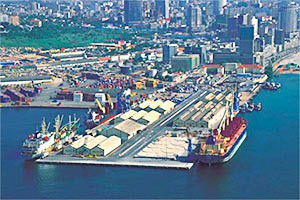Staying competitive in Africa - Blog article
The African market, growing at more than 5 percent per year for the last decade, is up for grabs by the major powers, especially China and the European Union. To stay competitive, the U.S. needs to extend the African Growth and Opportunity Act, set to expire on Sept. 30, as soon as possible.
In 2009, China became Africa’s largest trading partner, overtaking the U.S. Combined with more than $30 billion of low-interest commercial loans to African governments and investments in virtually every country, it is argued by some that China is poised to “take over” the African market to the detriment of the U.S. and other investors.
That argument, of course, is simplistic. With 54 countries and more than one billion people, Africa is too large to be dominated by any individual country. Nevertheless, extensive investments in natural resources and infrastructure projects have firmly established Chinese companies on the continent. There is a growing frustration in Africa, however, over China’s loans that require African governments to purchase Chinese services and products in exchange for natural resources, and their companies employ far more Chinese workers, perhaps as many as 750,000, than Africans.
While China is clearly a competitor for market share, the U.S. should be as concerned, if not more so, by the EU that is trying to corner the African market through Economic Partnership Agreements (EPAs).
For the last decade, the EU has been trying persuade, cajole and coerce, sometimes all at once, African nations to sign EPAs, which are free trade agreements. While the EPAs will be phased in over time, they grant Most Favored Nation status to goods and services from EU countries. Specifically, African governments will be required to eliminate tariffs on at least 80 percent of imports from EU and provide reciprocal market access on preferential terms.
To ensure that African governments agreed to these terms, the EU threatened to deny African governments preferential access if the EPAs were not initialed by October 1, 2014. In fact, when Kenya failed to come to terms by the deadline, flower farmers, who employ several thousand local workers and whose product constitutes 9 percent of Kenyan exports to the EU, were slapped with higher tariffs. Kenya finalized its EU deal on October 15 but Kenyan firms were required to pay taxes for another three to six months. Thirty-five African countries have initialed EPAs.
The EPAs have been described as a “raw deal” and “the modern day equivalent of the nineteenth century carve-up of Africa,” by Chukwuma Charles Soludo, a former governor of Nigeria’s Central Bank and an advisor to the World Bank. This argument has resonance for several reasons.
Giving preferential access to products from Europe into Africa undermines regional integration as well as efforts by the Africa Union to create an African-wide free trade area. Intra-African trade is already low by global standards, and the EPAs will further impede its growth. As an example, once the EPAs are in force, a European company exporting a product to Tanzania will enjoy a lower tariff than an African company exporting that same product to Tanzania from South Africa or Nigeria.
The EPAs also pose a threat to the renewal of the AGOA. Some in Congress have questioned why the U.S. should renew AGOA if African governments are giving the EU preferential access to their markets. In fact, African nations had little choice but to agree to the EPAs or face the loss of duty free access to the EU for many of its exports.
So how should the U.S. respond?
As the cornerstone of the U.S.-African commercial relationship for the last fifteen years, AGOA provides non-reciprocal duty-free access to the U.S. market for 6,400 products from 40 countries. It has generated tremendous good will for the U.S. and has contributed to Africa’s impressive growth and improved governance across the government.
Exports to the U.S. under AGOA have increased more than four times between 2001 and 2014, and non-oil trade has more than tripled during this time. AGOA has contributed to the creation of more than 350,000 jobs in Africa and, indirectly, several million more jobs.
AGOA has also encouraged more U.S. exports to Africa. Today, more than 120,000 jobs in the U.S. are supported by our trade with Africa.
For this reason, AGOA needs to be extended quickly before orders from U.S. importers begin to be cancelled due to the uncertainties, thus undermining much of what has been accomplished.
AGOA is the rare piece of legislation that enjoys broad bipartisan support. Both Representative Paul Ryan, Chair of Ways and Means, Senator Orin Hatch, chair of the Senate Finance committee, have expressed support for AGOA’s renewal as have Representatives Charlie Rangel and Karen Bass.
The Obama administration has called for a 15 year renewal of AGOA.
Once the legislation is extended, the Obama administration then needs to begin a dialogue with our African partners of how to structure a more mature and reciprocal trade relationship. In many respects, Obama’s legacy in Africa will revolve not just in extending AGOA but putting in place a trade framework that ensures that American companies are not permanently disadvantaged in a market they are just beginning to discover.
The first step, however, is to renew AGOA as soon as possible.
Eizenstat is a former chief White House domestic policy adviser to President Jimmy Carter; U.S. ambassador to the European Union, under secretary of Commerce for International Trade, under secretary of State for Economic, Business and Agricultural Affairs, and deputy secretary of the Treasury in the Clinton Administration; Schneidman is former assistant secretary of state for African Affairs under Clinton.


